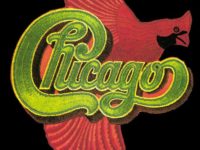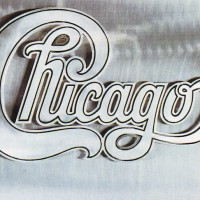Fewer bands in rock have been more unjustly maligned than Chicago. Now, I’m no fan of the David Foster years, but being responsible for some of the shlockiest pop of that era doesn’t diminish the more innovative and ambitious output of the seventies, especially those first five albums.
And paying the bills have allowed the band to continue touring and recording for forty years; if you want to go see a classic slice of AM radio like "Make Me Smile" performed by the original band with most of the original players, you only need to wait for them to show up in your town and buy a ticket. You can't say that about many well-known rock bands today, much less one with a three part horn section.
From the mid seventies until his departure about a decade later, bassist Peter Cetera was the focal point of the group as he increasingly took on the lead vocal role for chart topping ballads. But before then, Chicago was very much a collective, where the stars were often that horn section, unmatched in all of rock except maybe Blood, Sweat and Tears (and still intact and potent today). Vocal duties were shared by Cetera, the late, great guitarist Terry Kath and keyboardist Robert Lamm. However, behind the scenes, the main guy driving the musical direction of the band was Lamm.
Lamm's compositions comprised the bulk of Chicago's early material, and not surprisingly, the early hits. "25 or 6 To 4", "Does Anybody Really Know What Time It Is?", "Beginnings", "Free" were all his compositions, as well as notable album cuts like "Dialogue (Pts. 1 & 2)."
After an unbelievable four double lp's in a row — made more incredible in that they all went gold and spun off eight hits — came Chicago's first single player, 1972's Chicago V. This is the album that contains Lamm's biggest hit to that point, the perennially catchy "Saturday In The Park" and his peaking songwriting skills dominate much of the album, making V one the group's very best releases of all time.
The song the kicks off V is, as noted by the title, a tribute to French-born classical composer Edgar Varèse, whose works are greatly admired by Lamm and other members of Chicago.
Frank Zappa was famously a huge fan from the time he was a teenager, and he turned other open-minded rock musicians like Chicago on to Varèse. Varèse had his fans among guys like Zappa and Lamm because he was a 20th century classical composer who experimented with creating new ways to present rhythms and timbres and was one of the first to incorporate electronic instruments. In fact, he is often referred to as the “Father of Electronic Music”.
In his own words (from the Chicago V liner notes), Lamm stated that Varèse’s music “really kind of set us free in terms of what was possible musically. And so what I was trying to say in ‘A Hit by Varèse’ was ‘Wouldn’t it be great if music this free could actually be accepted on radio — not just by the programmers, but by the people listening?'”
Lamm, who undertook the vocal duties himself, wrote fairly brief and straightforward lyrics to express those sentiments:
Something to move me
Remove me and groove me, you want to know why?
I’m so tired of oldies
And moldies and goldies, that I want to cry
While the song's lyrics spoke about a desire for less conventional music, the music behind it is meeting that desire with shifting meters, chromatic harmonic structures and sizzling dueling solos among all three of the horn players: Lee Loughnane (trumpet), James Pankow (trumpet) and Walter Parazaider (sax). Terry Kath's feedback that opens the song before it really starts mimics the opening of Steppenwolf's "Magic Carpet Ride", while Cetera's melodic bass is supple and even adventurous (an aside: Cetera, like Sting, is an outstanding bassist who submerged his instrumental prowess in favor of singing songs that aren't that demanding of their musicianship. I miss the old versions of both of these guys).
Being that 1972 was during the golden age of Yes, King Crimson and Emerson, Lake and Palmer, it might be easy to accuse Lamm of following their lead, but one listen of 1969's Chicago Transit Authority dispels the notion the he and his band were latecomers to jugular rock. While far from unlistenable, “A Hit By Varèse” is definitely not something that radio programmers even in the relatively freewheeling early seventies would provide airplay for as eagerly as "Saturday In The Park," but it's one of the better examples of what this band was capable of, in terms of both of songwriting and playing chops.
Over the succeeding years, Lamm's dream of freer forms of music being widely accepted on the radio not only was no closer to reality, it became more and more elusive. Chicago went on to even greater commercial success but the cost of the success was that the band's visionary and best songwriter gradually withdrew from a prominent role; fresh ideas and risk-taking soon disappeared.
The man who complained "I'm so tired of oldies" wrote a very oldie sounding "Harry Truman" a mere three years later; he could no longer fight the disinterest toward the loftly ideals of his hero Edgar Varèse. But when Robert Lamm was in a fighting mood, he could make some damned good music. As in "A Hit By Varèse."




I've never really enjoyed A Hit By Varese. I've long considered it a weak spot on Chicago V. Now That You've Gone, State of the Union, Dialogue Pts. 1 & 2, and what I consider to be one of the best songs the band has ever recorded, Goodbye all see far more play than A Hit By Varese. That being said I think all of V (including A Hit By Varese) really shows off Peter Cetera's bass chops, possibly moreso than any other Chicago album. I think this was when Peter, as a bass player, was at his peak.